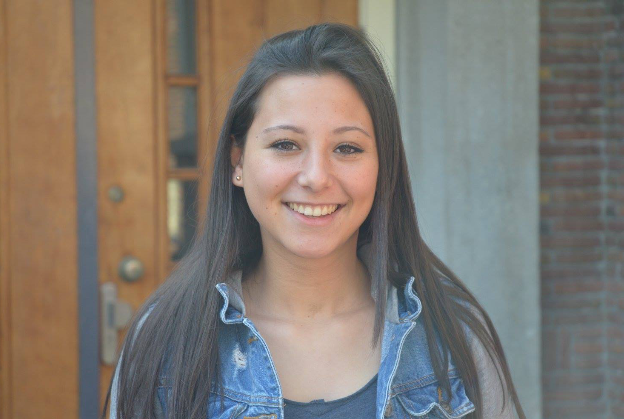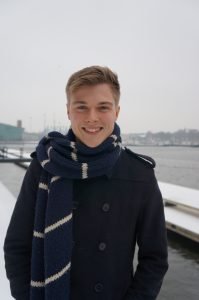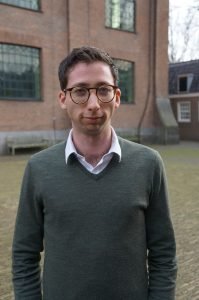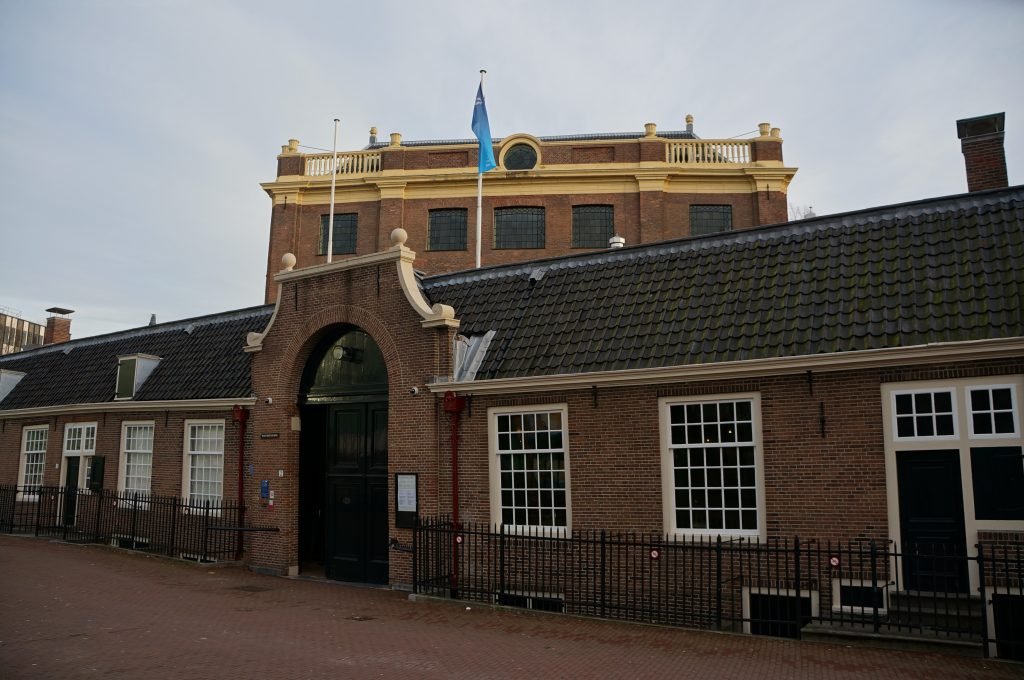In the third article of her series about faithful students, Laura Illeris shows that Judaism is not only a religion, but also the glue of a people. For young Jews, whether secular, religious, liberal or orthodox, holding on to tradition is what allows them to feel part of something bigger.

Inside the Uilenburger synagogue of the Beit HaChidush in Amsterdam’s old Jewish quarter, men and women both young and old are chanting prayers in Hebrew and taking part in the ceremony of the Torah reading on Saturday morning, the day of Shabbat. To outside observers, this surely seems like a natural way for Jewish people to express their religious commitment. However, not all attendants at the service are religious, or even believe in God. So why, in a time of declining religious affiliation, are Jews who do not even believe in God spending their Saturday morning taking part in these sacred rituals?
More than just a religion
As most Jews will tell you, Judaism is much more than just a religion. It’s about being part of a people. Asher Waterman, 26, feels connected to Judaism out of a cultural feeling. According to him and other young Jews, being Jewish is more about practices and customs than it is about believing in God. Waterman is part of the Liberal Jewish Community (LJG) in Amsterdam, and has been active in a secular Jewish youth organisation called Habonim.
Dania Rodill, 21, who also belongs to the LJG and is active in Habonim sees Judaism as her heritage. What does being Jewish mean to her? “Tradition is a large part of being Jewish,” she says, and adds that it is also about the shared history of the Jewish people.

Even for those without Jewish parents, Judaism extends beyond religious obligation. Barry Vingerling, 26, converted to Judaism at the age of eighteen and sees Judaism as a cultural tradition. He says: “Being Jewish means having a strong connection to the Jewish people.” He emphasizes that the Jewish tradition is about more than just believing. “Of course it can be a religious experience, but most of the time it’s a custom you do every day, so it becomes part of you.”
“The Jewish law is a system of values,
it could be there for everyone”
This connection to something broader than just a religion often gives Jews a strong sense of community and belonging, something Waterman and Vingerling see that other young people are often yearning for. Waterman explains: “We are living in a society that is much more individualistic than it used to be and I see that some young people are really searching for something more than just being with themselves.” He adds: “I think growing up as I did, in a very close community, has its advantages.”
Community and belonging
The Jewish community is often seen as a tight-knit, even closed off, community. There are several tight-knit Jewish communities in Amsterdam. In fact, some of the interviewees knew each other from their synagogue or from Habonim. However, ultimately there are just as many different Jewish communities as there are different ways of being Jewish.

Despite the shared identity, Vingerling says that he finds it difficult as a Jew in Amsterdam to feel part of one community. With such a small number of Jews, 0.7 percent of the adult population in Amsterdam (there are more Buddhists than there are Jews), he has noticed that diversity in views and practices are more obvious. Liberal and secular Jews, for example, stress that they are different to the orthodox communities.
As with any other group or religion, some sub-groups are more inclusive than others. Vingerling, who identifies as a modern orthodox Jew, criticizes religious leaders who do not preach acceptance and inclusivity. He believes that Jewish law could apply to anyone. “It’s a system of values,” he explains. “It could be there for everyone.”
The progressive Beit HaChidush synagogue has a female Rabbi, allows women to touch de Torah scroll, and focuses on LGBTQ+ issues
However, within certain communities you are not considered Jewish if both of your parents are not Jewish, and converting is more difficult. One interviewee felt unwelcome in one of Amsterdam’s orthodox synagogues after the congregation realized that her father is not Jewish.
Jonathan Gill, chairman of the Beit HaChidush, also recognizes this discord. He says you will not find the Beit HaChidush on just any list of synagogues in Amsterdam as they are not formally recognized by some other Jewish institutions due to their progressive practices. Their practices include having a female Rabbi, allowing women to touch the Torah scroll, and a general focus on LGBTQ+ issues.
Daniel Asher, 22, is in the process of converting to Judaism and says he has found a very welcoming community at the Beit HaChidush. “I absolutely love how accepting they are,” he says.
Implications of the Jewish identity

The Jewish community is extremely diverse. Nonetheless, what binds them together is their shared history. The Second World War has damaged the family history of many, and as a result many young Jews grow up with first or second-hand accounts of the trauma from parents and grandparents. Waterman says: “I always hate it, when people ask about my Judaism, to talk about the Second World War, but of course it is always somehow apparent.”
Waterman also feels that others do not understand what it means to have more than one identity. It seems to him and others that many non-Jews, even highly educated people, still know very little about Judaism. The interviewees say they sometimes receive ignorant questions such as ‘Do you have an Israeli passport?’ or ‘Do you speak Jewish?’. Waterman says that most people are just curious and does not see ignorant questions as coming from a malignant place.
“Feyenoord fans chanting about sending the ‘Ajax Jews’ to the gas is shocking, but not surprising”
Gill borrows James Baldwin’s expression ‘sacred ignorance’ (a term used to explain how ignorant white Americans could be to the struggle of African-Americans) to explain how people in the Netherlands typically perceive Judaism. He feels that, like African-Americans have in the United States, Jews in the Netherlands live amongst a majority that are largely unaware and unconcerned with their existence and struggles. Because of this, he sees that anti-semitic sentiment is often expressed in ignorance, such as how supporters of the Amsterdam football club AFC Ajax are called ’Joden’ (Jews). The fans of Feyenoord, the big rival from Rotterdam, also have a chant about sending the ‘Ajax Jews’ to the gas, which Gill finds “shocking but not surprising.”
While Rodill, a secular Jew, states that she has never experienced any anti-semitism, others say they have experienced everything from ’mild suburban anti-semitism’ to outright aggressive anti-semitic behavior. Vingerling, who wears the Kippah (an obvious Jewish symbol), has been yelled at on public transport. He was even threatened to the point where he felt he needed to stop wearing the Kippah temporarily because it felt unsafe. It also takes only a quick comparison of different places of worship to see that there are generally much higher levels of security at synagogues.
Being Jewish means being different, not necessarily in a negative or positive way
For some, the Jewish identity means being confronted with identity politics. Being Jewish undeniably links the people of Israel, and therefore Jewish university students sometimes experience that people expect them to come up with answers for the Israeli-Palestinian conflict. Some disagree with mixing up politics and religion, and some feel that their Jewish identity is a reason to be properly informed about the different sides to the conflict.

The struggles that young Jews face are not always as severe, and sometimes simply has to do with being different. “Because Judaism is not just a religion, but also a culture, means that you are always kind of different,” Waterman says. “In most cases you are the only Jew in the classroom, and the only Jew that people come across.” Vingerling also says that “Being Jewish means being different. Not necessarily in a negative or positive way.”
The Jewish identity clearly plays a big role in the lives of young Jews in Amsterdam. While the Jewish community in Amsterdam is small and diverse, and young people are least represented in synagogues, those who do take active part in the community have many reasons for holding on to tradition. These young Jews are bound together by shared history, traditions and struggles against anti-semitism, even while differences emerge in beliefs and practices.
This is the third article of a series on faithful students in Amsterdam. Read the first article for an introduction to the state of religion among the youth of the capital city and the second article about Christianity and the struggles young Christians are facing.
